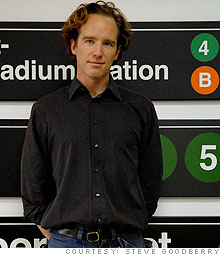Pond Scum Cleaners

http://www.bluewaterpond.com/
Pond scum, or blue-green algae, is a common sight in the Land of 10,000 Lakes.
For Blue Water Ponds, a start-up company operated by two recent college graduates, pond scum is a business opportunity.
The company, which won the student division of the 2010 Minnesota Cup challenge, aims to prevent summer algae blooms with a sustainable solution: barley. The company offers its services placing bales of pelletized barley into ponds in the spring and then harvests weeds in the summer to allow beneficial plants to continue growing. The treatment for the average pond hovers around $400 annually, said Ben Schurhamer, president of Blue Water Ponds.
"Barley straw has definitely shown efficacy," Dave Wright, a scientist with the Minnesota Department of Natural Resources, said. But the exact science behind the barley treatment is unknown. Two theories exist:
•The barley might create a competition between harmful plants and other bacteria for nutrient resources that wouldn't normally exist.
•Other bacteria might create a growth-inhibiting compound after feeding on the carbohydrate-rich barley, reducing algal growth.
"We don't know how, but the barley changes the biological composition of the water," Schurhamer said.
The idea of using barley to clear bacteria from water is not a new one.
Though the method has been around for thousands of years, it was modified in the 1990s by researchers in England and became a standard practice for the many lakes, canals and ponds across Great Britain.
The treatment has received a wide following in the past few years as a more environmentally stable means of algal control. Normally, pond and lake owners use synthetic algaecides such as Polyquat or the hypertoxic copper sulfate to control the plants.
Blue Water Ponds is one of the few companies in the area that offers the barley service. Metro area cities have used the treatment in more than 100 ponds in Bloomington, Shoreview, Minneapolis and others.
Connor McComas, an environmental sciences graduate of Iowa State University, and Schurhamer, a biochemistry graduate from the University of Minnesota, co-founded the company in 2007 after completing internships with an environmental sciences research group.
Blue Water Ponds started officially in 2009 as a two-man operation, but recently added two more full-time employees, and often adds one or two others during the spring. The company expects to complete barley treatments on 200 to 400 ponds this summer, and to generate between $20,000 and $30,000 in revenue, McComas said.
Bloomington used the method last year to clear local ponds of algae, duckweed and other nuisance plants in a more sustainable way.
"We've used herbicides in the past, but we started the barley method to try and identify a more sustainable measure," said Bryan Gruidl, a water resources specialist for the Bloomington Public Works Department.
Dawn Sommers, a public information manager for the Minneapolis Parks and Recreation Board, said that the city has been using the barley method for several years, and said it has been "very successful in helping control algal growth."
Sam Villella, a homeowner in Blaine, lives near a community pond that had serious algal problems for several years. The residents were eager to remove the slime that covered nearly a quarter of the water, but were extremely wary of pesticides that might add harmful chemicals to the water and hurt the wildlife in the area. Villella said after some searching, he discovered Blue Water Ponds, and employed them the next year. Villella said he and his neighbors were thrilled with the results.
"The difference was night and day," Villella said. "We were very happy with the clarity of the water, there was no slime, and there was no stink. Even people that were skeptical were amazed.''
For more unusual ways to make money, visit this site.
[Via - StarTribune.Com]
The Million-Dollar Idea in Everyone: Easy New Ways to Make Money from Your Interests, Insights, and Inventions
IdeaSpotting: How to Find Your Next Great Idea
How to Make Millions with Your Ideas: An Entrepreneur's Guide by Dan S. Kennedy
101 Businesses You Can Start With Less Than One Thousand Dollars: For Stay-at-Home Moms & Dads
Make Your Ideas Mean Business
Link of the day - If You Sell Links On Your Site, I Will Buy Them Off You

